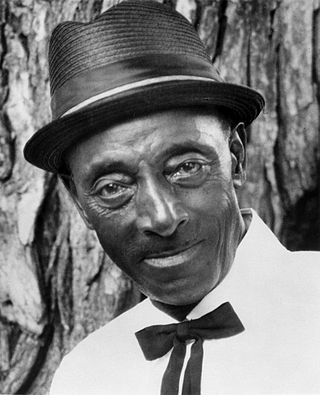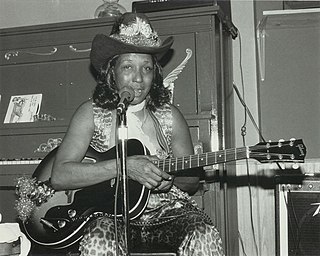Related Research Articles

Fred McDowell, known by his stage name Mississippi Fred McDowell, was an American singer and guitarist of hill country blues music.

R. L. Burnside was an American blues singer, songwriter and guitarist. He played music for much of his life but received little recognition before the early 1990s. In the latter half of that decade, Burnside recorded and toured with Jon Spencer, garnering crossover appeal and introducing his music to a new fan base in the punk and garage rock scenes.

Jessie Mae Hemphill was an American electric guitarist, songwriter, and vocalist specializing in the North Mississippi hill country blues traditions of her family and regional heritage.

North Mississippi Allstars is an American blues and southern rock band from Hernando, Mississippi, founded in 1996. The band is currently composed of brothers Luther Dickinson and Cody Dickinson. Their most recent album Set Sail was released in 2022.
Othar "Otha" Turner was one of the last well-known fife players in the vanishing American fife and drum blues tradition. His music was also part of the African-American genre known as Hill country blues.
Chulahoma is an unincorporated community in Marshall County, Mississippi, United States. It is located in the hill country of northern Mississippi.

David "Junior" Kimbrough was an American blues musician. His best-known works are "Keep Your Hands off Her" and "All Night Long". In 2023, he was inducted in the Blues Hall of Fame.
Fife and drum blues is an American folk music form derived from country blues, martial music tradition, and African rhythms. It is performed typically with one lead fife player and a troop of drummers. Unlike a drum corps, the drum troop is loosely structured. As such, a fife and drum band may have a variable number of snare, tom, and bass drum players. A large military-style bass drum is preferred. Fife and drum performances are often family affairs held at reunions, summer community picnics, and on holidays.

Robert "Wolfman" Belfour was an American blues musician. He was born in Red Banks, Mississippi. When he was a child, his father, Grant Belfour, taught him to play the guitar, and he continued his tutelage in the blues from the musicians Otha Turner, R. L. Burnside, and Junior Kimbrough. Kimbrough, in particular, had a profound influence on him. His music was rooted in Mississippi hill country traditions, in contrast to Delta blues. His playing was characterized by a percussive attack and alternate tunings.

Kenny Brown is an American blues slide guitarist skilled in the North Mississippi Hill Country blues style.
Deep Blues: A Musical Pilgrimage to the Crossroads is a British documentary film, released in 1991, and made by music critic and author Robert Palmer and documentary film maker Robert Mugge, in collaboration with David A. Stewart and his brother John J. Stewart. The film provided insight into the location, cast and characteristics of Delta blues and North Mississippi hill country blues. Filming took place in 1990 in Memphis, Tennessee, and various North Mississippi counties. Theatrical release was in 1991 and home video release in the United Kingdom, the next year, as was a soundtrack album. A United States consumer edition came in 2000.
Johnny Woods was an American blues singer and harmonica player in the north Mississippi hill country blues style.

Cedric O. Burnside is an American electric blues guitarist, drummer, singer and songwriter. He is the son of blues drummer Calvin Jackson and grandson of blues singer, songwriter, and guitarist R. L. Burnside.
Calvin Jackson was an American drummer from north Mississippi. He is considered an innovator in the Hill country blues style of drumming, having incorporated elements of the regional Fife and drum bands style in the blues band setting.
The Kropotkins are an American avant-garde music collective based in Memphis and New York City founded in 1994 by drummer Jonathan Kane and Dave Soldier, who is best known as a violinist but plays banjo in the group. Its other members have included Lorrette Velvette (vocals), Samm Bennett (percussion), Moe Tucker of the Velvet Underground, Mark Feldman (violin), Mark Deffenbaugh, Alex Greene and Charles Burnham (violin). The band is named after Russian anarchist Peter Kropotkin. In 1999, the group had six members. Soldier had the idea to start the band while performing with John Cale at a concert in Germany; Soldier has described this idea as "a kind of epiphany."

Sid Hemphill was an American blues multi-instrumentalist and bandleader who played in his own string band mainly in Mississippi. He recorded for Alan Lomax in 1942 and again in 1959.
Robert L. Boyce was an American blues singer, songwriter, and guitarist born and raised in Como, Mississippi.

Up and Rolling is the tenth studio album by American band North Mississippi Allstars. It was released on October 4, 2019, through New West Records, making it their first album for the label.

Everybody Hollerin' Goat is an album by the American musician Othar Turner, released in 1998. He is credited with the Rising Star Fife and Drum Band. Turner was 90 when he recorded the album. The title refers to Turner's barbecued goat parties.
References
- ↑ "Mississippi Hill Country Blues: An Introduction | R.L. Burnside – Junior Kimbrough – Mississippi Fred McDowell – Jessie Mae Hemphill – North Mississippi Allstars". Hillcountryharmonica.com. Archived from the original on July 31, 2012. Retrieved December 10, 2012.
- ↑ "Oxford Blues". Mississippi Blues Trail . Mississippi Blues Commission. Retrieved May 4, 2015.
- ↑ "North Central Hills". MS Archaeology Trails. Mississippi Department of Archives and History. Archived from the original on May 5, 2015. Retrieved May 5, 2015.
- ↑ Palmer, Robert (1982). Deep Blues. New York: Penguin Books. p. 36.
- ↑ Palmer (1982). Deep Blues. p. 37.
- ↑ Palmer (1982). Deep Blues. p. 39.
- ↑ "Mississippi Fred McDowell: Profile of Delta Bluesman Mississippi Fred McDowell". Blues.about.com. Archived from the original on November 18, 2012. Retrieved December 10, 2012.
- ↑ "Hill Country Blues". Msbluestrail.org. Retrieved December 10, 2012.
- ↑ Battaglia, Nicole (April 22, 2011). "Here to Stay: Carrying on the Legacy of Hill Country". Yale Herald. Retrieved December 10, 2012.